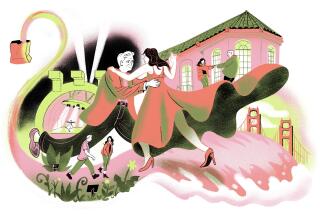Dear, Dear Brenda THE LOVE LETTERS OF HENRY MILLER TO BRENDA VENUS; text by Brenda Venus; edited by Gerald S. Sindell; introduction by Lawrence Durrell (Morrow: $17.95; 191 pp.)
- Share via
Henry Miller’s death in 1980 brought an end to one of the most extraordinary romances ever conceived, coming as it did from the impassioned mind of a man nearly 90, admittedly a physical ruin, and the good graces of a young actress, aptly named Brenda Venus, in the prime of her life. For Miller, it was love at first sight, kindling an ardor that kept him alive for four more years. He did what he did best--he wrote; and he laid it all on the line in more than 1,000 letters from which this volume is drawn.
An ordinary man, blind in one eye and partially paralyzed, might have taken to bed and wasted away, but not Henry Miller. Instead, he fell hopelessly, shamelessly in love and spilled it out in letters to his dear Brenda, wallowing in a euphoria that lasted to his end. He worked himself into a lather, at least on paper, and lived for those Thursday nights when she appeared at his door, took him by his arm and drove him to dinner at his favorite Japanese restaurant in the Hollywood Hills. One stormy night, to spare him hobbling through the puddles in the parking lot, she simply picked him up and carried him upstairs to the entrance. He accepted this with aplomb and a jaunty smile.
The importance of “Dear, Dear Brenda,” however, goes beyond the anecdotal and into the larger questions of Love and Sex that Miller parried all his life. As Brenda herself put it in one of her connecting passages that weave through the book, “I was never able to reconcile fully the two sides of Henry I knew--the shy, simple, gentle man who gave me subtle lessons in the beauty of lovemaking through books, art and poetry, and the other Henry who took such pride in the directness, no matter how coarse, of so much of his writing about sex.”
As though in answer, Henry wrote to her, “I wish God had given me the gift of writing about sex like D. H. Lawrence. Somehow my efforts always seem crude and shocking. . . .” Yet in the next breath, so to speak, he wrote, “Yes, dear Brenda, though it is the absolute truth what I said over the phone--about chastity and a higher level of love and all that, nevertheless the opposite is also true, that more and more I want to . . . get inside that gorgeous figure. Looking at you tonight was like gazing at a Hindu goddess, one from a temple of Love, where there are prostitutes in the service of God or Krishna or whomever. Where there is no sense of sin, adultery or evil. Where all is one.”
Although these passions surge and recur throughout this correspondence, Brenda is good enough to wait him out and take no offense. She seemed to understand that while Henry had explored the wilder shores of love and lust, it was more in writing than in deed. As Durrell notes in his preface, “Brenda Venus played the finest role an actress could wish for--Muse and Nurse of a great spirit in his decline.” She was indeed a blessing, as his children and friends testify.
Miller fans will discover many familiar preoccupations in these pages as he, in the role of mentor as well as lover, urges her to read certain authors--Dostoevski, Isaac Singer, Knut Hamsun, Herman Hesse, Whitman, et al. and praises the glories of watercolor.
He advises her on the pursuit of her acting career, wistfully monitors her meetings with directors and fellow actors, guards her health and--I could hardly believe it--he even dipped his penknife in alcohol so they could slash their arms and become “blood brothers” with vows to love forever!
Only Henry Miller. Sensible, world-weary readers may find this ludicrous; the ancient bedridden man on the telephone calling her just to say good morning or good night, and writing, “I’m simply trying to hold you to the paper. It’s a way of holding you in my arms and caressing you. . . .” And then, “. . . if Life is good, so must Death be. They are both mysteries, not disasters.” So irresistible he was that all good sense and world weariness vanish without a trace.
Henry Miller’s voice, unique, original and irascible as it was, nevertheless is the voice submerged in so many of us. In one of his most poignant passages, he describes what the last of his life has become: “About saints, both male and female. Somehow they are always associated in my mind with fierce sexual desires. That’s why their struggle with the flesh is so heroic . And I, in my old age, I who thought I had solved that problem, find it flaring up again.” Whew!
More to Read
Sign up for our Book Club newsletter
Get the latest news, events and more from the Los Angeles Times Book Club, and help us get L.A. reading and talking.
You may occasionally receive promotional content from the Los Angeles Times.








